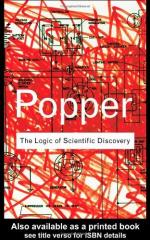
|
| Name: _________________________ | Period: ___________________ |
This test consists of 5 short answer questions, 10 short essay questions, and 1 (of 3) essay topics.
Short Answer Questions
1. What does Popper feel about an axiom in relations of von Mises view of an axiom of randomness?
2. What does Popper say about the number of possible events with regard to testability?
3. What does Popper assume is a main characteristic of quantum theory formula?
4. What principle does science presuppose?
5. According to Popper, what takes the place of strict laws in atomic science?
Short Essay Questions
1. What does Popper say about simplicity and the philosophers who emphasize its importance?
2. How is differentiation possible between theories whose differences are small and difficult to calculate?
3. How is logical probability represented?
4. What two scientific arguments does Popper use to verify his beliefs about inductivists?
5. Why do falsifiable statements hold the greatest promise for science?
6. What does Popper believe regarding the logical proximity of a theory to empirical statements?
7. What is the basis of the wave theory used by Schrödinger?
8. According to Popper, where does the value of simplicity lay?
9. Why, according to Heisenberg, can measurement not be a basis for prediction?
10. Why does Popper prefer quantitative over qualitative methods?
Essay Topics
Write an essay for ONE of the following topics:
Essay Topic 1
Explain the problem of demarcation according to Popper. How does Popper feel about demarcation? How does this issue relate to empirical science? Explain your answer.
Essay Topic 2
Regarding the protocol of sentences, compare and contrast the following scientist's views: Reininger, Carnap, and Neurath. Which does Popper agree with? Explain you answer using examples as support.
Essay Topic 3
In one experiment designed to somewhat mimic studies by Compton-Simon and Bothe-Geiger, Popper suggests the use of an "imaginary selection." What is the purpose of this selection?
|
This section contains 789 words (approx. 3 pages at 300 words per page) |

|




